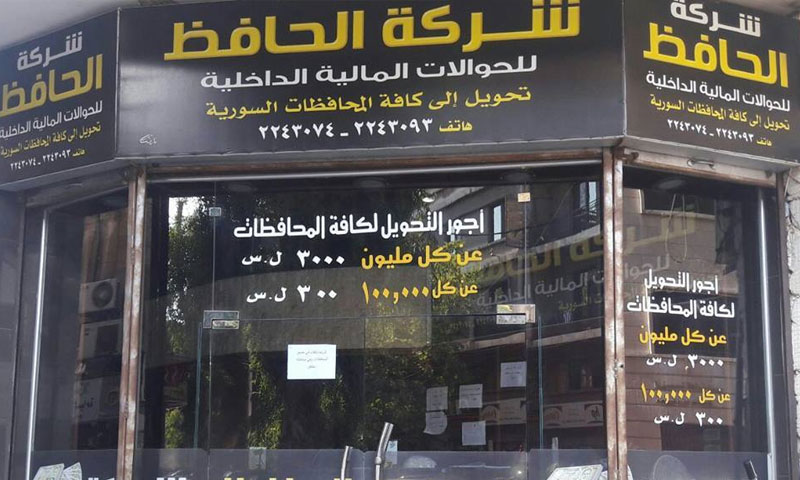



Keeping pace with the exchange rate’s fluctuations of the Syrian pound against the US dollar, traders of northern rural Homs are living a harsh reality for there are no currency exchange companies in the area, as they cannot obtain official licenses, putting the traders face to face with the dilemma of incapability at providing foreign currency needed to protect their capital from erosion.
The Syrian pound’s volatile exchange rate and the difficulty of obtaining foreign currency crippled the traders’ ability to conduct their business normally; traders are now calculating their losses instead of profits at the end of each day. A whole lot of them, accordingly, have shut down their stores and bought dollars to abandon the market and avoid further loss since they cannot predict the exchange rate swings and are unable to get dollar when the working day reaches a halt.
Despite the shrewdness most major traders of the northern countryside of Homs show in dealing with the volatile exchange rate, the shutdown of unlicensed currency exchange shops after the “reconciliation agreement” _ an agreement signed by opposition factions in the northern Homs countryside with the Russian forces_ caused them a problem in securing foreign currency and having an access to the black market.
It also made them fall into the trap of exchange rate fluctuations for being unable to exchange currency in a timely manner, not to mention the risks they face upon dealing with foreign currency exchange companies in the center of the Homs and Hama provinces.
Abu Muhammad, a trader from the northern countryside of Homs asked not to be named, said that the shutdown of currency exchange shops in the northern countryside of Homs after the reconciliation agreement was disturbing.
Interviewed by Enab Baladi, he added the shutdown of the currency exchange shops prompted them to resort to the exchange companies in the cities of Hama and Homs to obtain foreign currency, a matter reigned by the watchful eyes of the security branches, for the latter are monitoring the work of exchange centers to the smallest detail.
Exchange rate fluctuations have imposed new laws among traders in general in Syria. For example, in the northern countryside of Homs, large amounts of payment are no longer delayed for more than three days. A payment policy has also been imposed on the sale; if a trader wants to buy a particular product, he has to pay large sums of money for reserving the goods as a first stage. Then, the price of goods is assessed on the day the goods are delivered.
Trader Abu Muhammad, for instance, made a ‘marble order’ to one of the companies, the value of which was 11 million pounds, on the condition that two million pounds be paid to book a place in the line and get the required quantity.
“Because it is difficult to exchange currencies, I converted the whole amount to the Syrian pound and paid two million pounds, waiting for consignments. Nonetheless, the circumstances have changed and the value of the Syrian pound against the dollar has fallen sharply,” pointing out that he converted one US dollar to 586 Syrian pounds. After just a few days, the Syrian pound dropped to 700 against the dollar which was a great loss for him.
“I can no longer get the dollar needed to mitigate the loss and the company is refusing to send me the order, given that the price of marble is on the rise and the company is not willing to fix the goods’ price. […] I lost too much money when I converted dollars to the Syrian pounds and marble’s price has been soaring. Now I need to convert another amount of money(dollar) to complete what I have started.”
Small traders are also stricken
In spite of the small capital invested in various fields, the fluctuation in the exchange rate has had repercussions on retailers, who are beginning to count losses rather than profits.
Abu Khalil, the owner of an agricultural pharmacy in Houla town, tells Enab Baladi about the impact of currency crisis on his work, noting that “although I sell the products of the pharmacy based on the value of the Syrian pounds against the US dollar, adding about 25 pounds to the original value at the sale, I am still bound to a daily loss. ”
“Most farmers have relinquished purchasing expensive pesticides in a packet, opting for buying only the amount they are in need of. The packet is, thus, sold over a week, each day at a different price depending on the exchange rate,” reported Abu Khalil.
The trader explains that this process and the accompanying fall and rise in the exchange rate lead to profit losses.
if you think the article contain wrong information or you have additional details Send Correction